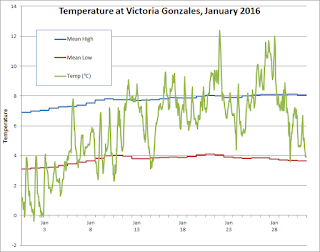It’s February 1, and time for a look back at the weather for
January 2016.
The most notable feature about the weather this past January
was the low total rainfall – just 47 mm compared with the 1981-2010 average of 104
mm of precipitation at Victoria Gonzales, making it the tenth driest January in 118 years of record keeping. It may surprise you that January was so dry. That may be because the number of days with measurable precipitation was actually slightly above average - 20 days this January versus 19 on average - but the rainfall amounts on those rainy days was significantly lower than normal.
I’ve talked previously about the
effect of the Olympic Mountain rain shadow in reducing the amount of
precipitation over Victoria, and January was a prime example of that. There
were numerous days in January when there was heavy rain to the north and west,
but Victoria received just a few sprinkles. For example, the Victoria Airport
– 25 km north of Victoria and outside the Olympic rain shadow – received 138 mm of precipitation in January, quite
close to its normal of 143 mm. Total precipitation amounts at the other
Environment Canada weather sites in the Victoria region include 54 mm at the University of Victoria and 75 mm at Esquimalt Harbour (which is further west and gets less rain
shadowing).
I thought it would be interesting to look in a bit more detail at the variation in rainfall around the region in January. Victoria's School Based Weather Station Network has dozens of weather sites in
the Victoria region, so I have used statistics from those sites in the chart below, which compares the January 2016 precipitation total at various
sites around Greater Victoria. You can see the impact of the rain shadow, especially in
the southern and eastern sections of the region. Some of the wetter locations
in the region received nearly four times the precipitation in January than Victoria
Gonzales.
Perhaps I will try to create a map to show this at some
point!
It’s also interesting to compare Victoria's January 2016
precipitation with other locations outside Greater Victoria. As the chart shows, Pender
Island (one of the drier locations on the Gulf Islands) got about 2.5 times as
much rain as Victoria. Nanaimo and Seattle both got about 4 times as much rain,
while Vancouver and Courtenay received nearly 4.5 times as much rain. Out on the exposed west coast of Vancouver Island, Ucluelet received a whopping 429 mm of rain - nearly ten times Victoria's total. Thank you rain shadow!
There was no snowfall in Victoria during January, although
some outlying areas did receive a dusting of snow. For example, there was 3 cm
of snow recorded at the Victoria Airport. The last time
Victoria received significant snowfall was January 2012.
Temperatures in January were a little above the average. At
Victoria Gonzales, the average daily high for the month was 8.1 degrees and the average
daily low was 4.4, resulting in a mean monthly temperature of 6.2 degrees. That compares with the 1981-2010 average of 5.9 degrees. The chart below compares the actual temperature trend (in green) with the average daily highs and lows for January. The month started well below average, then gradually increased, reaching above average temperatures for most of the second half of the month. The milder temperatures
are consistent with an El Nino year, although it wasn’t as warm as during past El
Nino years when the January temperature has averaged 6.8 degrees, as I discussed here. The warmest recorded temperature during the month was 12.8 on January 22 and the coldest recorded temperature was -0.5 on January 2. There were 3 days (the first three days of the month) with temperatures below freezing, which was close to the average of 3.4 days.
One note on the Victoria Gonzales precipitation total. The
Environment Canada weather site at Gonzales was missing precipitation data for
some days in January 2016. Luckily, there are two Victoria School Based Weather Stations within 500-600 m of Gonzales: Margaret Jenkins Elementary and SMU. I used
an average of these two sites to fill in the missing data for Victoria
Gonzales.



This comment has been removed by a blog administrator.
ReplyDelete